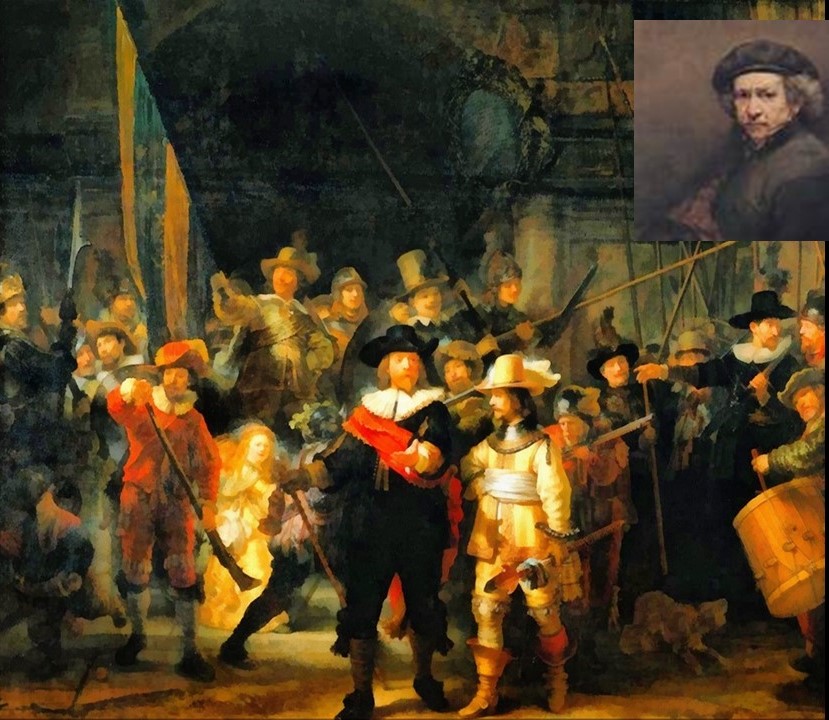Answer: God’s invisible, moral character is revealed in His creation.
Question: How can the invisible be visible?
That’s where we ended last Thursday’s post.
Since the creation of the world God’s invisible qualities … have been clearly seen, Romans 1:19–20.
The creation makes visible the invisible. This seems like a conundrum. How can this be? How can the invisible be visible?
Paul states that these things are “being understood (i.e. “reflected on with insight”) by what has been made,” that is, by God’s “workmanship.” That wonderful word workmanship comes from the Greek term poiēma, from which we also derive “poem.” The creation, including humankind, is the workmanship, the poiēma, of God.
And the workmanship reveals the craftsman. An author is made visible by the words in his book. The painter is seen by her work on the canvas. The potter is revealed in the finished vase, the poet in her poetry, the choreographer in the dance.
The creator’s existence, and aspects of his character, are revealed through his art. The visible is always a reflection of the unseen creator. At the level of the Primary Creator and His creation, the apostle Paul says this reflection is so unmistakable that people who deny the creator are without excuse.
 Imagine visiting a Dutch museum that housed a collection of Rembrandt’s paintings. If you spent the day reflecting on the collection, what might you learn about the painter?
Imagine visiting a Dutch museum that housed a collection of Rembrandt’s paintings. If you spent the day reflecting on the collection, what might you learn about the painter?
You could learn about the world he inhabited, the clothing people wore, the food they ate, the housing they lived in. You could learn the things he was interested in, the stories he was telling through his painting, his vision and perspective of life.
On a technical side you could learn about how he painted, how he put the base on the canvas, how he used color and light, how he used his brush and palate.
You appreciate this master, but you also could learn a lot about the man simply by viewing his art.
Now suppose, as you were leaving the museum, a friend said, “This was a wonderful day. These paintings were magnificent. But of course there was no Rembrandt!” How would you respond? “Are you crazy? Are you stupid?”
And yet this is exactly what people do every day. They look at the creation and deny the existence of the Creator. This is an absurd statement. A code without a code maker is impossible. A word is not born without a word maker. Without a poet there can be no poem. And yet, every day, atheists draw such irrational conclusions. This is the framework of the modern naturalistic society.
People are suppressing the truth! Why?
People suppress obvious truth for moral reasons
I think individuals and cultures reject God, not for metaphysical reasons but for moral reasons. As Paul argues, and creation witnesses, God’s workmanship reveals His existence and something of His nature and character so that people are without excuse. From the revelatory point of view of the created order, there is no excuse for a human to deny God.
So why do we deny him? For moral reasons. We want to live in a universe without moral restraint. We want to be free to live a libertine life, without moral boundaries. But have we considered that a life without boundaries is a life without consequences? Have we stopped to think that a life without consequences is an inconsequential life?
 Perhaps one of the most honest people to state the moral rationale for his denial of God is Aldous Huxley. In Confessions of a Professional Free-Thinker Huxley wrote:
Perhaps one of the most honest people to state the moral rationale for his denial of God is Aldous Huxley. In Confessions of a Professional Free-Thinker Huxley wrote:
I had reasons not to want the world to have meaning, and as a result I assumed the world had no meaning, and I was readily able to find satisfactory grounds for this assumption… for me, as it undoubtedly was for most of my generation, the philosophy of meaninglessness was an instrument of liberation from a certain moral system. We were opposed to morality because it interfered with our sexual freedom.
 Adolph Hitler writes that “The greatest blow that ever struck humanity was the coming of Christianity.” Why did he come to this conclusion? Because God is a moral Being who puts a crimp on human license. Hitler described the Almighty as “… the God of the deserts, that crazed, stupid, vengeful, Asiatic despot, with the power to make laws! … that poison with which both Jews and Christians have spoiled and soiled the free, wonderful instincts of man ….”
Adolph Hitler writes that “The greatest blow that ever struck humanity was the coming of Christianity.” Why did he come to this conclusion? Because God is a moral Being who puts a crimp on human license. Hitler described the Almighty as “… the God of the deserts, that crazed, stupid, vengeful, Asiatic despot, with the power to make laws! … that poison with which both Jews and Christians have spoiled and soiled the free, wonderful instincts of man ….”
Why did Hitler hate Christians and Jews? Because they worship a moral God. (Here’s an important corollary: it was Christianity and Judaism that lifted people from a mere animal existence. See Sexual Anarchy: Judeo-Christian Morality As Deviant.)
In short, God has revealed Himself to all human beings through His creation. Human beings can know that He exists and something of His nature and character. But instead of wanting to know God, we suppress the truth so we can feign sovereignty over our own lives.
In the next post in this series we will consider our human response to this revelation.
- Darrow Miller







1 Comment
Carlos Said Pires
May 6, 2016 - 10:10 amGreat message!!